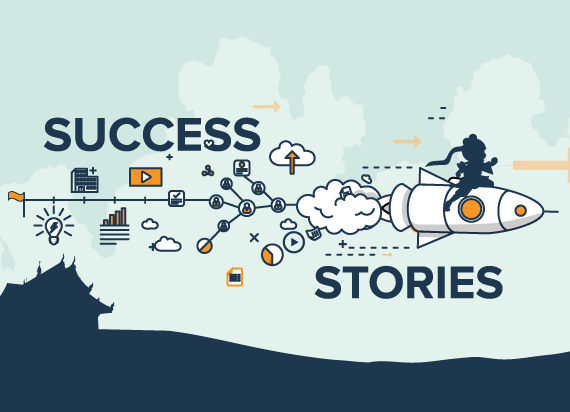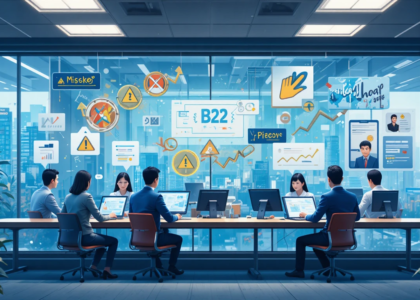B2B Lead Generation for Asia is not a one-size-fits-all game. From the bustling tech corridors of Tokyo to the rapidly growing entrepreneurial hubs of Jakarta, the region demands strategies that reflect cultural nuance, digital maturity, and shifting buyer expectations. Businesses entering this vast market often fall into the trap of copying Western frameworks, only to discover that local buyers respond to a completely different rhythm.
Asia is more than just a market—it’s a collection of ecosystems, each with its own language, decision-making processes, and growth trajectories. Japan thrives on trust, precision, and long-term partnerships. Indonesia, meanwhile, values agility, relationships, and creative problem-solving. This diversity challenges brands to avoid cookie-cutter approaches and instead build tailored tactics that resonate with decision-makers on their turf.
In this landscape, AI Marketing is no longer optional—it’s the compass guiding marketers through complexity. With services like i2 Communications AI Marketing Service, companies can automate lead scoring, personalize content for specific cultural contexts, and track engagement across platforms that traditional CRMs struggle to capture.
From Tokyo to Jakarta, the promise is clear: those who master regional intricacies and leverage AI-driven insights will not only generate leads but also build a sustainable competitive edge in Asia’s fast-changing B2B environment.

Understanding Regional Business Cultures: Tokyo vs. Jakarta
Cultural intelligence is the backbone of B2B Lead Generation for Asia. Without it, even the most sophisticated campaign risks falling flat. Tokyo and Jakarta offer a study in contrasts that every B2B strategist should examine closely.
In Japan, decision-making is consensus-driven. Relationships are nurtured with formality, patience, and meticulous attention to detail. A pitch that feels rushed or overly aggressive risks alienating potential partners. Business communication often extends beyond the deal itself—it’s about showing reliability over time. Lead generation here requires trust-building campaigns, thoughtful content in native Japanese, and value demonstrations that go beyond ROI.
Jakarta, on the other hand, operates at a different rhythm. Indonesian businesses thrive on agility, speed, and creativity. Personal relationships carry weight, but so does flexibility in negotiations. Decision-makers in Jakarta are more likely to respond to engaging, visually compelling content and dynamic networking opportunities. Here, B2B Lead Generation for Asia thrives through WhatsApp outreach, interactive webinars, and on-the-ground partnerships.
AI Marketing bridges these gaps. With i2 Communications AI Marketing Service, a company can segment audiences with precision—delivering a whitepaper in Japanese emphasizing reliability to Tokyo executives while sending a bold, visual case study to Jakarta’s business leaders. The ability to tune messaging at scale is where technology transforms cultural complexity into a growth opportunity.
The gritty truth? Success comes to those who don’t force Asia into one mold. Instead, they bend their strategies to the nuances of each city, making technology the silent ally in cultural fluency.

Digital Channels Driving B2B Growth in Asia
Digital transformation is rewriting the rules of B2B Lead Generation for Asia. Unlike the West, where LinkedIn dominates, Asia’s digital ecosystem is highly fragmented. Tokyo thrives on LINE, a messaging platform embedded deeply in both personal and professional lives. Jakarta pulses with WhatsApp, where business conversations move faster than formal emails. Meanwhile, platforms like WeChat, TikTok, and LinkedIn still play critical but region-specific roles across the continent.
The challenge? Knowing where to invest time and budget. Blindly pouring resources into LinkedIn ads without acknowledging Indonesia’s WhatsApp-driven sales culture or Japan’s reliance on LINE can mean missing out on real conversations where deals are actually made.
Here’s where AI Marketing reshapes the battlefield. Tools like i2 Communications AI Marketing Service monitor digital touchpoints across multiple channels, identifying where target audiences are most engaged and predicting which platform offers the highest conversion probability. That level of clarity empowers businesses to stop guessing and start executing with precision.
For instance, a B2B firm entering Tokyo may discover through AI insights that executives engage more with industry-specific webinars hosted on local platforms than with generic LinkedIn events. In Jakarta, the data may reveal that decision-makers click more on mobile-first campaigns than traditional email outreach.
The lesson is gritty but undeniable: in Asia, the channel is the strategy. Success in B2B Lead Generation for Asia hinges on meeting decision-makers where they already spend their digital lives. Ignore that, and you’re just shouting into the void. Embrace it with AI-powered clarity, and you’ll find yourself speaking directly into the ears of the right prospects.

Localized Content Strategies for Stronger Engagement
Content is king, but in Asia, context is the emperor. B2B Lead Generation for Asia thrives when messaging feels native, not translated. A whitepaper written for an American audience won’t resonate in Tokyo unless it reflects the formality and precision Japanese executives expect. Similarly, Jakarta’s fast-paced entrepreneurs won’t waste time on long-winded reports—they want snappy visuals, relatable storytelling, and actionable insights.
Localization goes beyond language. It’s about tone, narrative, and cultural alignment. In Japan, case studies showcasing long-term partnerships and reliability will build trust. In Indonesia, success stories that highlight creativity, agility, and rapid growth will capture attention. The key is to strike the right emotional chord, because in Asia, emotion and logic are partners in decision-making.
AI Marketing transforms content strategy from guesswork into science. With i2 Communications AI Marketing Service, businesses can analyze local content performance, identify cultural resonance points, and automatically tailor delivery. Imagine running one campaign where Tokyo sees a polished, data-rich whitepaper while Jakarta receives a visually engaging infographic—all powered by AI’s understanding of audience behavior.
This level of personalization isn’t just smart—it’s survival. In a region as diverse as Asia, pushing generic content is the equivalent of throwing darts in the dark. Localized strategies light the way. If you’re serious about dominating B2B Lead Generation for Asia, don’t just translate your content—rebuild it for the people you want to reach.

Events, Networking, and Hybrid Lead Generation Tactics
Face-to-face connections remain the lifeblood of B2B Lead Generation for Asia. Trade shows in Tokyo, industry conferences in Jakarta, and hybrid summits across the region serve as fertile grounds for building trust and accelerating deal pipelines. Despite digital transformation, the human element is irreplaceable in Asian markets.
In Tokyo, networking is often formal and ritualistic. Handshakes, business cards, and carefully choreographed presentations remain key. Jakarta, in contrast, thrives on dynamic, energetic networking where spontaneity can open doors. Both styles matter, and both require preparation.
Hybrid tactics—blending digital with physical events—are now unlocking new levels of engagement. Virtual webinars leading into in-person meetups, or digital follow-ups after conferences, keep conversations alive long after the event ends. This hybrid approach extends the lifespan of each interaction and deepens trust.
AI Marketing injects data-driven intelligence into this ecosystem. With i2 Communications AI Marketing Service, event organizers and B2B leaders can score leads in real-time, track attendee behavior, and deliver personalized follow-ups. Imagine identifying which Jakarta attendees engaged most with your digital booth or which Tokyo executives downloaded your whitepaper post-event—then reaching out with tailored content.
The truth? In Asia, events are not just networking—they’re strategic battlegrounds. Those who combine cultural fluency with AI-powered follow-up will dominate pipelines. Everyone else will leave events with stacks of business cards but no deals.

Case Studies: Success Stories from Japan and Indonesia
Theory is cheap; execution speaks louder. Two companies stand out as gritty examples of mastering B2B Lead Generation for Asia—one in Tokyo, one in Jakarta.
A Japanese manufacturing firm wanted to expand its supplier network. Traditionally cautious, they struggled with cold outreach campaigns. By leveraging i2 Communications AI Marketing Service, they built a campaign that emphasized reliability and technical precision—values critical to Japanese buyers. The result? A 45% increase in qualified leads within six months, with executives noting the campaign “spoke our language.”
Meanwhile, a fintech startup in Jakarta needed rapid growth. Instead of following Western playbooks, they tapped into WhatsApp marketing and hybrid networking events. Supported by AI Marketing insights, they launched interactive video campaigns tailored to local decision-makers’ mobile-first habits. Within three months, their lead pipeline doubled, proving that agility and cultural alignment trump brute-force tactics.
Both stories underscore a hard lesson: success in Asia is not about size—it’s about fit. Whether in Tokyo’s meticulous boardrooms or Jakarta’s buzzing co-working spaces, B2B Lead Generation for Asia thrives when AI-powered personalization meets cultural intelligence. That’s where i2 Communications AI Marketing Service transforms from tool to growth engine.
Conclusion: Building Scalable B2B Strategies Across Asia
Asia is not one market—it’s a mosaic. From Tokyo’s precision to Jakarta’s agility, B2B Lead Generation for Asia requires a blend of cultural fluency, digital savvy, and relentless adaptability. Businesses that cling to cookie-cutter Western tactics will drown in irrelevance. Those who embrace the region’s diversity will rise above.
The secret weapon? AI Marketing. With platforms like i2 Communications AI Marketing Service, companies can decode cultural signals, personalize campaigns at scale, and transform fragmented channels into unified growth engines. This isn’t theory—it’s practice.
The gritty truth is simple: Asia rewards those who play by its rules. Build trust in Tokyo. Spark energy in Jakarta. Bridge the gap with AI. That’s how you move from being just another name in the market to becoming a trusted partner across borders.
The future of B2B in Asia belongs to those who respect its differences and harness technology to amplify its potential. Are you ready to make that leap?




